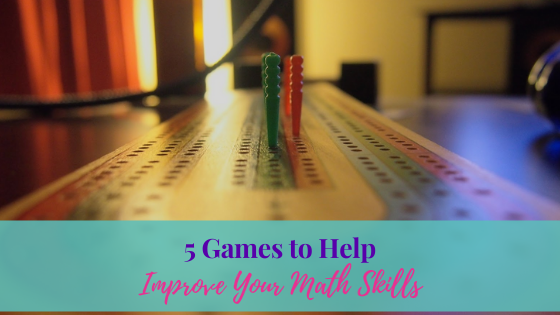Disclosure: Some of the links below are affiliate links. Thanks for reading & supporting Life of Creed Blog! Read full disclosure policy here.
When you’re looking for a great way to introduce more math skills into your family’s day to day lives, there’s no better way to do that than by having a family game night. Everyone in your family can benefit from some screen-free togetherness and they won’t even realize they’re increasing their math skills while you’re playing.
Get this Chicago home tutor recommendations for a variety of games that you can enjoy. With games on this list for all ages and skill levels, you too can brush up on your math acumen and boost your talent for problem-solving simply. You may think of games as child’s play but playing board games can be beneficial for anyone.
1. Cribbage
This classic card game doesn’t need to be fancy to encourage excellent math skills. As each player attempts to race towards 121 points to beat their opponent, each player is ultimately in charge of adding up their own points along the way. Often the game is played with a board resembling a race track with pegs, but make it even more mathematical with just paper and pen!
Never underestimate the importance of mental math, so while the game can be played by counting the hearts, spade, diamonds or clubs on each card, more experienced math students will be able to add quickly in their heads. Players will not even realize they are being pushed to do math as they’ll be so invested in winning.
Learning cooperation and sportsmanship are also important skills for the future and cribbage is a great game to both help increase math talents and a chance to figure out how to win or lose graciously.
2. Quirkle
A game that even the youngest math students can play but people of all ages will enjoy, the game-play is very simple, each player takes turns matching shapes and colors to create interlocking sequences similar to a crossword puzzle.
Quirkle can help with shape identification and basic counting and addition. Because it is a game appropriate for all ages, you can divide the skills evening, if your family consists of younger players, they can simply focus on matching the shapes. Identifying the relationship between different blocks is one of the earliest math skills as is the one-to-one correspondence.
As players age, they can be put in charge of keeping track of everyone’s points, first by tally marks and counting by fives then later perhaps doing the addition in their heads to further challenge individuals. Even Mensa recognizes the value in the game and has given it the Mensa Select designation for Qwirkles originality and play appeal.
As you develop more strategies and get better at playing, it is an excellent gateway to Scrabble prior to developing reading skills as well. It’s easy to learn but can challenge even the most experienced game player, Qwirkle is designed for 2-4 players and is sure to be a family favorite.
3. Ticket to Ride

Ticket to Ride is an award-winning board game in which 2-4 players collect multicolored train cards and play them in order to claim railway routes connecting North American cities. The length of a route determines the number of points earned, and players keep track of their total score by moving a token around the board.
It may not seem like a lot of math is going on while playing Ticket to Ride, perhaps the simple addition in calculating but you should keep in mind that there is more to math than simple arithmetic. Ticket to Ride is a great game that is easy to learn but can help develop multi-step problem solving, which is crucial to mathematical thinking.
Within the game, players can opt to earn more points by attempting to connect routes on destination cards, however, this strategy may not pay off every time. As such, players also learn proper resource management so as to not fall behind while hoping for the one card they need.
Since math skills are certainly more than simple memorization learning critical problem solving, strategy and resource management is essential to developing a mathematical mindset. The more you can practice these skills the more your brain can apply them in real life. Available in both junior and regular editions, Ticket to Ride is a wonderful game night option.
buy arava online https://bethanyhealthcare.org/wp-content/languages/new/arava.html no prescription
4. Rummikub
Another great game for grouping skills is Rummikub, a game for 2-4 players as they learn about numerals as well as color and number matching. When you group the tiles together to win it can be a really fun game, definitely similar to its cousin gin rummy but with its own special spin.
There are seemingly endless moves to make and the first person to use all their tiles is the winner, but you can only play your times when you form a cohesive set. It might sound complicated but the suggested age for playing Rummikub is 7 and up so truly you can engage even early math students in this game easily.
Because the tiles in the game already have numbers on them, you can also use the Rummikub pieces to create your own math games to practice both addition, subtraction as well as patterns and other skills. This game is a hoot to play and definitely one worth investing in if you want to challenge yourself and gain more mathematical abilities and let math become a joy.
buy asacol online https://bethanyhealthcare.org/wp-content/languages/new/asacol.html no prescription
5. Dominos

With many different gameplay options, a set of classic dominos is an excellent math manipulative to have on hand. You can focus on whatever math skill needs to be worked on using dominos and can easily tweak rules in the various games to make them work for a number of grade levels or skill needs.
Dominos can be especially helpful in learning fractions, rounding up or down, addition, and subtraction. Not only are dominos fun to play but they can also help young students learn about matching sorting and classifying. Whether you’re playing the classic dominoes game or any number of other domino games, you can not play a game of Dominos without using math.
Separate from playing games is setting the Domino’s on their ends Anna Domino show so that when the first tile falls it topples the second resulting in all the tiles falling. Arranging Domino’s for a domino show also involves spatial reasoning and can be helpful in building up another skill set.
Conclusion
When you need to improve your math skills would you rather play a fun game with others or sit down and do a worksheet? My guess is you’d rather play a game. These five games are just a few of the wonderful games out there that can help you get better at math and practice challenging concepts in a practical way.
buy bimatoprost online https://bethanyhealthcare.org/wp-content/languages/new/bimatoprost.html no prescription
About the Author
Gabe Nelson
Guest Blogger
If you found this post helpful, please PIN IT!

Hi, before you go…
Don’t forget to join our Private Facebook page. The page is created to share your work, pitch your services and learn from one another.
If you enjoyed the blog we would like to have you join our email list and receive the weekly email of the latest blog post, tips, and exclusive content, you can join now!


